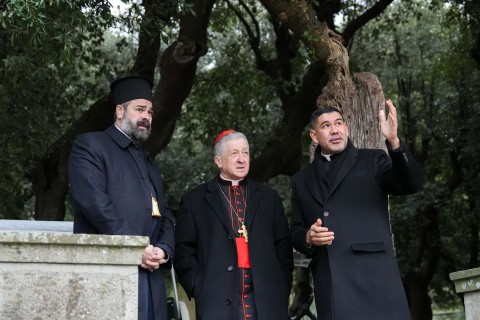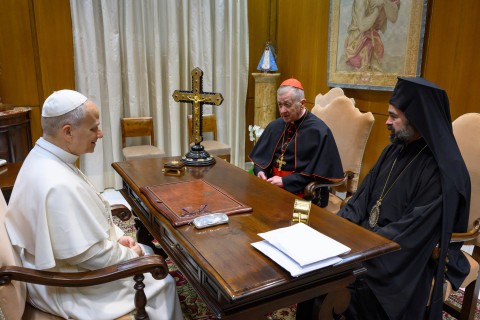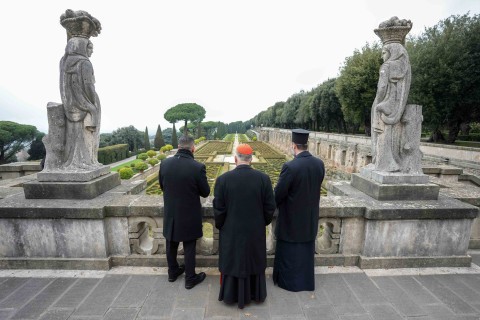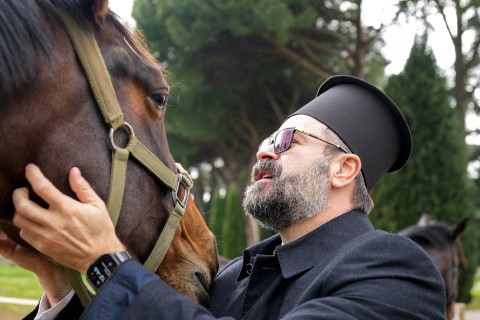Browsing News Entries
Holy See: Christians are most persecuted religious community in world
Posted on 03/5/2026 03:21 AM ()
Archbishop Ettore Balestrero, the Holy See’s Permanent Observer to the UN in Geneva, highlights the persecution that Christians face across the world and emphasizes that nations must ensure religious freedom.
Lebanon’s Catholic Patriarchs and Bishops call for peace
Posted on 03/5/2026 03:08 AM ()
Amid ongoing violence in the Middle East, the Assembly of Catholic Patriarchs and Bishops in Lebanon releases a statement warning that escalation threatens human dignity and calling for dialogue, national unity, and renewed international efforts for peace.
Cardinal Cupich: 'We must embrace principles to avoid wars'
Posted on 03/5/2026 00:00 AM ()
In a wide-ranging interview with Vatican Media, Cardinal Blase Cupich, Archbishop of Chicago, calls for restraint to avoid unnecessary military escalation abroad and prevent things from quickly spiraling out of control. He also urges overcoming polarization and protecting the human dignity of all peoples in the United States, in a way that ensures law and human rights are not opposed, but united.
Pope receives advanced telehealth device for children‘s healthcare
Posted on 03/4/2026 08:36 AM ()
The “Patrons of the World's Children Hospital” donate a TELADOC LITE telemedicine system to Pope Leo XIV for paediatric care for children in need.
Church is holy by Christ's presence, not human perfection, pope says
Posted on 03/4/2026 07:30 AM (USCCB News)
VATICAN CITY (CNS) --The Catholic Church is both a community made up of fragile and limited human beings and a divine reality, Pope Leo XIV said at his weekly general audience.
The pope continued his series on the Second Vatican Council March 4 in St. Peter's Square, emphasizing one of its principal documents, the Dogmatic Constitution on the Church, "Lumen Gentium," which examines the nature and identity of the Church.
He said the Church is "a community of men and women who share the joy and struggle of being Christians, with their strengths and weaknesses, proclaiming the Gospel and becoming a sign of the presence of Christ who accompanies us on our journey through life."
However, he added, it also has a "divine dimension." Its divine nature "does not consist in an ideal perfection or spiritual superiority of its members, but in the fact that the Church is generated by God’s plan for humanity, realized in Christ," he said.
As proof of this coexistence, Pope Leo pointed to the life of Jesus Christ to illustrate the two dimensions of the Church. People were moved by his humanity, the sounds of his voice, as well as his message.
"Those who decided to follow him were moved precisely by the experience of his welcoming gaze, the touch of his blessing hands, his words of liberation and healing," the pope said. "At the same time, however, by following that man, the disciples opened themselves to an encounter with God. Indeed, Christ’s flesh, his face, his gestures and his words visibly manifest the invisible God."
It is through this humanity, through the struggles and fragility of the faithful that Christ's presence is manifested, the pope said.
"This is what constitutes the holiness of the Church: the fact that Christ dwells in her and continues to give himself through the smallness and fragility of her members," he said.
Pope Leo said this dichotomy is quintessential of God's love, making himself visible through the weakness of his creation and "continuing to manifest himself and to act." The faithful are called to act through communion and charity among all.
"Let us strive to be authentic witnesses of the love of Christ so that all can recognize in us and among us the charity that characterizes true Christians and builds up the Church," the pope said in his greetings to English-speakers.
Church can teach what's at stake when nations choose war, not peace, cardinal says
Posted on 03/4/2026 07:30 AM (USCCB News)
CASTEL GANDOLFO (CNS) -- In a fractured world threatened by war, Christians can strengthen their bonds of unity to show the world that peace is possible, Cardinal Blase J. Cupich of Chicago said.
Leaders in the Catholic Church also "need to make sure people understand what's at stake when we opt for war and the consequences that result," he told Catholic News Service March 2.
"I think that church leaders need to pastor our people, giving them a voice about what are the principles from a moral dimension when it comes to pursuing peace, and what should be kept into consideration as we see conflicts in some way trying to be resolved by acts of war, wars that seem to be a choice rather than something that is a matter of necessity," he said.
Cardinal Cupich spoke to CNS during a special visit to the papal farm and the Borgo Laudato Si' center in the papal gardens in Castel Gandolfo. He was taking part in an ecumenical pilgrimage together with Metropolitan Nathanael, who presides over the Greek Orthodox Metropolis of Chicago, to celebrate the 1,700th anniversary of the Council of Nicaea.
The two Christian leaders traveled from the Windy City to Istanbul to meet with Orthodox Ecumenical Patriarch Bartholomew of Constantinople and then on to Rome to visit key Christian sites and to meet with Pope Leo XIV.
"There'll be three people from Chicago: the pope, Cardinal Cupich and myself," Metropolitan Nathanael told CNS. "We will have a lot to talk about when we meet," though he was unsure about admitting to the pope -- a White Sox fan -- that he is a Yankees fan.
Before meeting the pope March 4, Cardinal Cupich and the metropolitan spent half a day March 2 at the papal gardens and the Borgo Laudato Si' zero-environmental-impact complex devoted to promoting Pope Francis' teachings on caring for creation.
The trip offers an opportunity "to strengthen the bonds of unity between our churches," especially at a time when the world seems to be so fractured by war and conflict, and "to announce to the world that peace is something we should all embrace," Cardinal Cupich said.
"It's an opportunity for us as well to double down on the importance of working together so that humanity can all flourish in a world in which there is peace," he said, adding that coming together at the Vatican-run center dedicated to promoting integral ecology, sustainability and a circular and generative economy was a good place to emphasize that call.
At Borgo Laudato Si', he said, "we see firsthand how we are one with all of God's creation, and that we live on this tiny speck of cosmic dust called Earth, in which we all are responsible for making sure it is a place that's a home, a common home for all of us."
Metropolitan Nathanael said, "Looking around the beauty of the grounds, we see what can occur when there's synergy, not only between God and human beings, but amongst human beings."
The Greek Orthodox leader, who is based in Chicago, presides over 58 parishes and two monastic communities in six U.S. states.
"I want to encourage all of our people -- Catholic, Orthodox and even nonbelievers -- to do all they can to find common ground among ourselves as children of God, to love God with all our heart and all our mind and all our soul, and to also love our neighbor," he said. "It's important for us to not just coexist, but to find ways to come closer to God and to one another."
Born in Thessaloniki, Greece, the metropolitan said he felt at home during a tour of the papal farm and saw the donkeys -- which provide milk to pediatric patients -- and four horses leisurely munching on a hill of clover.
While one chestnut horse happily bonded with the metropolitan, the purebred white Arabian horse named "Proton" skittishly avoided his orbit.
Cardinal Cupich and Metropolitan Nathanael also brought freshly-cut flowers grown at the papal farm with them to leave and pray at the tomb of Pope Francis in Rome's Basilica of St. Mary Major.
Pope Leo visited and inaugurated the center in Castel Gandolfo Sept. 5, 2025. U.S. Father Manuel Dorantes, a Chicago priest, has been the administrative-management director of the Laudato Si' Center for Higher Education since Dec. 1, 2024, when Pope Francis appointed him to a four-year term.
JRS offers aid to displaced migrants amid growing violence in Lebanon
Posted on 03/4/2026 07:09 AM ()
As violence intensifies in Lebanon, hundreds of thousands of people are being displaced around the country, prompting humanitarian organizations to respond urgently to growing needs for shelter, food, and psycho-social support.
How the Benedictine monks in Jerusalem are living the war
Posted on 03/4/2026 06:16 AM ()
The abbot of the German-speaking Benedictine Abbey of the Dormition in Jerusalem describes the monks' reaction to the outbreak of the war with Iran.
"We cannot remain silent": UISG to hold global prayer for peace
Posted on 03/4/2026 05:34 AM ()
The International Union of Superiors General (UISG) calls for "prayer, fasting, and action for an unarmed and disarming peace" to take place on Friday, March 6, at 3:30 pm (Rome time). The event will be livestreamed and open to the faithful and all people of goodwill.
AI companies aim ‘not to help workers, but to replace them'
Posted on 03/4/2026 05:18 AM ()
William Jones of the Future of Life Institute speaks to Vatican News about the current state of AI development, the impact it is already having on human beings, and the role of religion in carving out a positive future for our species.





